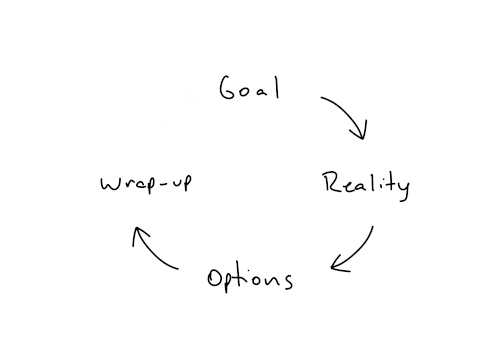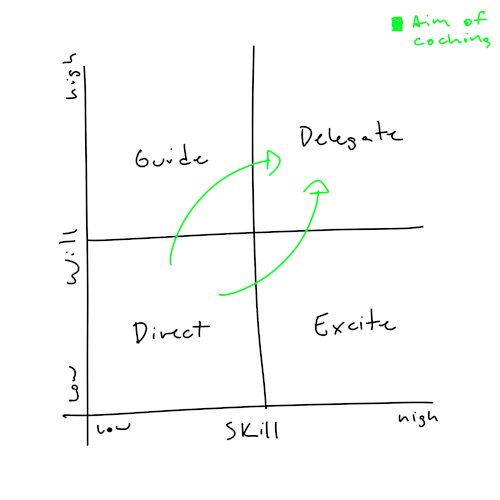The content below is primarily from The Tao of Coaching.
It is not about you. It's about the coachee.
Don't rely on assumptions. Ask a lot of questions.
Learn to be comfortable with awkward silences. Resist the urge to fill every blaqnk space with words.
At the end of each session, ask yourself: Did I help them think today? If the answer is yes, congrats! You had a good session.
Help them have a more accurate assessment of their skills. It is hard to improve when you are in the unconscious incompetence stage of competence.
Help them become independent.
The GROW Model
A simple four-step structure for coaching sessions.
- Goal. Agree on the goal of the discussion.
- Reality. Assess reality. Share specific examples.
- Options. What could be done? What will be done?
- Wrap up. Commit to action, define a timeframe, and identify possible obstacles

Goal
- Agree on a topic for discussion
- Agree on a specific objective
- Set long-term aim if appropriate
Reality
- Invite self-assessment
- Offer specific examples of feedback
- Avoid or check assumptions
- Discard irrelevant history
Options
- Cover the full range of options
- Invite suggestions from the coachee
- Offer suggestions carefully
- Ensure choices are made
Wrap-up
- Commit to action
- Identify possible obstacles
- Make steps specific and define timing
- Agree on support
Selecting an appropriate coaching style

- For the task, diagnose the coachee's skill and will levels
- Identify the appropriate style (Direct, Guide, Excite, Delegate)
- Agree your intended approach with your coachee
read more about selecting an appropriate coaching style
Motivating your coachee
As you chat with your coachee check if they are in the Cycle of motivation or demotivation.
Sample GROW questions
Goal
- What is it you would like to discuss?
- What would you like to achieve?
- What would you like from this session?
- What would need to happen for you to walk away feeling that this time was well spent?
- If I could grant you a wish for this session, what would it be?
- What would you like to be different when you leave this session?
- What would you like to happen that is not happening now
- What would you like not to happen that is happening now?
- What outcome would you like from this session/discussion/interaction?
- Is that realistic?
- Can we do that in the time we have available?
- Will that be of real value to you?
Reality
- What is happening at the moment?
- How do you know that this is accurate?
- When does this happen?
- How often does this happen? Be precise if possible.
- What effect does this have?
- How have you verified, or would you verify, that that is so?
- What other factors are relevant?
- Who else is relevant?
- What is their perception of the situation?
- What have you tried so far?
Options
- What could you do to change the situation?
- What alternatives are there to that approach?
- Tell me what possibilities for action you see. Don't worry about whether they are realistic at this stage.
- What approach/actions have you seen used, or used, yourself, in similar circumstances?
- Who might be able to help?
- Would you like suggestions from me?
- Which options do you like the most?
- What are the benefits and pitfalls of these options?
- Which options are of interest to you?
- Rate from 1-10 the practicality of each of these options.
- Rate from 1-10 the interest level of each of these options.
- Would you like to choose an option to act on?
Wrap up
- What are the next steps?
- Precisely when will you take them?
- What might get in the way?
- Do you need to log the steps in your diary?
- What support do you need?
- If needed, how and when will you ask for help?
